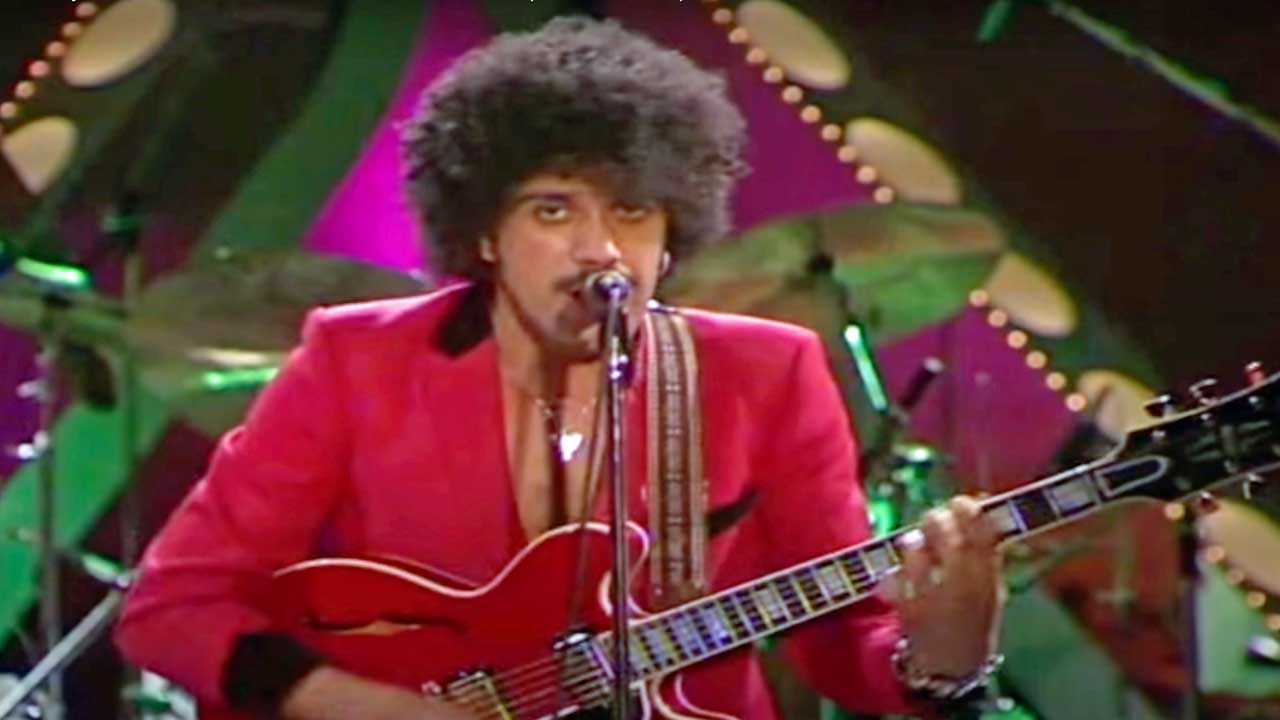
In July 1982, Thin Lizzy's Phil Lynott released Together, the first single from his second solo album, The Philip Lynott Album. Two years earlier, debut solo album Solo In Soho had been a top 30 hit and spawned a pair of hit singles in Dear Miss Lonely Hearts and Kings Call, while a remix of the album's Yellow Pearl had been selected as the new intro music for long-running TV show Top Of The Pops. All in all, things were looking up.
Following the release of Together, Lynott put together a band to play a 12-date tour of Ireland, with a lineup that included two keyboard players, Lizzy man Darren Wharton and Auto Da Fe's Trevor Knight. The so-called Soul Band was completed by guitarist Gus Isodore, drummer Robbie Brennan – who would later join Lynott in his post Lizzy project Grand Slam – and bassist Jerome Rimson. Lynott would switch from his usual instrument and play guitar.
After kicking off at the Rialto, in Londonderry, Northern Ireland, the tour headed south to play shows in the Republic, including a pair of festival dates in Macroom and Mullingar. The run of bookings also included a set at the St. Francis Xavier Hall in Dublin, which was filmed for an Irish TV documentary, Renegade: The Philip Lynott Story, and an appearance at the Punchestown Festival on July 18, which climaxed with the band jamming with Paul Brady and Rory Gallagher.
In September the band headed to Europe for a few shows, then to Scandinavia in October, with a reconfigured lineup that included drummer Mark Nauseef, who'd had a brief spell in the Doug Yule-led version of The Velvet Underground and played with Ronnie James Dio's Elf, and had also deputised for Brian Downey when he missed a run of live Thin Lizzy dates. There was a also new second keyboardist in the unlikely shape of former Rainbow and Wild Horses and future Dio bassist Jimmy Bain.
While in Sweden, the Soul Band made their one and only TV appearance, on the short-lived music show Casablanca. Hosted by Hélène Benno and Janne Nilsson, Casablanca's set was inspired by the movie of the same name, complete with palm trees on the backdrop and fancy cocktails for the guests. It ran for just five months before being canned.
The song the Soul Band performed on Casablanca was The Man's A Fool, from The Philip Lynott Album, described by Lynott on Radio Copenhagen as "the story of a man who thinks the world can be saved, just by us being together and pulling together as one". It was a slick piece of disco-friendly pop, complete with happily parping horns and sound effects that could have been borrowed from a game of Space Invaders. On the live performance, there's even a brief slap bass solo from Jerome Rimson. Killer On The Loose, it is not.
In contrast to the Irish dates, which had been fun for all involved, the Scandinavian shows were a wretched experience. Bain had joined the touring party expecting to have easy access to drugs, and when this turned out not to be the case, things went south very rapidly.
"It was an evil tour, a very unpleasant experience," sound engineer Peter Eustace told biographer Mark Putterford, in 2002's Phil Lynott: The Rocker. "Jimmy Bain couldn’t get any heroin and he was climbing the walls. Phil was out of it too, and he was an absolute pig to the whole crew. He treated us abysmally. Then halfway through the tour he came up to me and said that he realised he’d been treating the crew badly, but from now on-he was going to turn his anger on the band, and give them the same treatment. Then he started to give the band a hard time for no reason.
"Unfortunately he laid into Gus Isodore one day, and he wasn’t going to take it. He’d pushed Gus too far, and suddenly this rather nice chap switched into streetwise-kid-from-Detroit mode, and threatened Phil with a broken bottle. Phil loved brinkmanship, pushing people as far as he could, but he realised this time he’d gone too far. I remember the shouts from the dressing room: ‘Sorry man, cool it! I was only joking, honest!’ I think it must’ve been the only time Phil ever turned white."
Back in Ireland, the band disintegrated. The album had flopped, and Lynott started the new year with a short run of dates as part of the Three Musketeers, who would eventually morph into Grand Slam. Then, in March, Thin Lizzy's Thunder And Lightning would hit the stores and crash into the UK Top 10. Thoughts of a solo career were put on hold.
There are many obvious postscripts to this tale, but one of the more unusual comes from Jerome Rimson, who reveals that the name of Lynott's short-lived band isn't as history has apparently decreed.
"We were never called the Soul Band as so many people have it," he told writer Alan Byrne, in the 2006 biography Thin Lizzy. "Everybody keeps calling it the Soul Band. It was simply the solo band. That kind of offended me, because the only reason they were saying that was because there was a load of black guys in the group. It was totally wrong."







